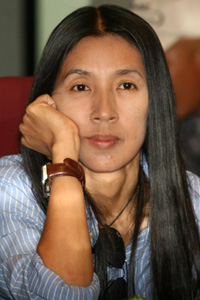
Even though analysts have tried to convince the public that it is external factors — such as depressed oil prices, global terrorism or the tumbling of the US Dow Jones index — that has sent the Thai stock market into a nosedive, no one can deny that local factors, especially a series of rumours, have made things worse.
The first round of rumours that caused shares to slide began with a warning by Gen Chavalit Yongchaiyudh.
Earlier this month, Gen Chavalit alerted Prime Minister Prayut Chan-o-cha to a possible "counter-coup" in the wake of political instability.
The coup rumour followed the purge within the police force in the wake of the corruption scandal involving the former head of the Central Investigation Bureau, Pol Gen Pongpat Chayapan, and his network.
The latest rumour had it that the Prayut government might invalidate 1,000-baht banknotes in a bid to wipe out corrupt politicians and officials who keep all their money in cash.
In fact, the banknote rumour is not new. It occurred once right after the National Council for Peace and Order (NCPO) seized power on May 22 and claimed Gen Paiboon Koomchaya as its source. Gen Paiboon, the chief of legal affairs for the NCPO and now justice minister, denied it.
Some say the rumour was reignited by the government's political enemies.
Other hearsay involves internal conflict within the NCPO and between the NCPO and the "old powers", a reference to soldiers loyal to Privy Council president Gen Prem Tinsulanonda.
In his warning about a counter-coup, Gen Chavalit made it clear the possible insurrection had nothing to do with army chief Gen Udomdej Sitabutr or incumbent commanders in the army.
Gen Chavalit is known to be one of the favourite "sons" of the privy council president and has maintained his place in the inner Si Sao Thewes circle.
But as the situation has unfolded, it has become clear these rumours were fanned to alarm the stock market and weaken the economy in an attempt to undermine the military government.
Gen Prayut has tried to clear the air by blaming global crises for the local economic stumble. He also calmed concern about His Majesty the King's health, citing medical reports that showed the monarch is in the pink.
Despite the rumours, it's apparent the prime minister still has full control.
He has prevented any challenge against the regime by placing his trusted men in key positions, particularly with the appointment of Gen Udomdej as deputy defence minister.
More importantly, the prime minister and NCPO chief is sure of his absolute power, stipulated under Section 44 of the interim charter.
"I will not stage a coup against my government," the prime minister said, which shows his confidence that no one else is powerful enough to stage a coup.
"No one can do it. Staging a coup is not that easy," he said.
Gen Prayut is right. It would be no easy task to remove him and his government from power.
He still maintains a grip on the army and enjoys strong fraternity with incumbent commanders, namely army chief Udomdej, Supreme Commander Worapong Sanganate, navy chief ADM Kraisorn Chansuwanit and air force chief ACM Treetos Sonjaeng.
So, the chances of a counter-coup are almost zero.
Moreover, the rumour about conflicts with "old powers" holds little water.
Gen Prayut secured blessings from the privy council president when he, together with his cabinet, paid a courtesy call on the latter after he formed the government late in September.
Similarly, Gen Prawit Wongsuwon, in his capacity as defence minister, took the top brass to see Gen Prem in early October.
The visit quelled the rumours of any tensions between the regime and the strongman of Si Sao Thewes.
Strategically speaking, a counter-coup is possible in two situations only. The most likely period is within the first three days after the seizure of power.
Generally, a coup is considered complete if there is no challenge after three days.
The other situation is when coup-makers fail to tackle the country's problems or when conflicts erupt within the regime.
Obviously, the two situations do not apply for the Prayut administration.
So the prime minister has every right to shrug off efforts to undermine his power through rumours — now the only weapon of his political opponents.
Wassana Nanuam is a senior news reporter covering military affairs for the Bangkok Post.
